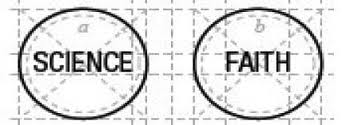Sponsored Links
Faith vs. science
Editor’s note: This article by a Philosophy professor discusses the mistakes in rejecting faith in the name of science and argues that morality is outside the realm of science. Readers are welcome to leave comments. (You, too, can have your articles published here. Send them through e-mail to OurHappySchool@yahoo.com)
© 2010-present by Jensen dG. Mañebog
 SOME SCIENCE ADVOCATES openly contend that science and religion are locked into a battle to the death. Believing that religion will sooner or later be certainly defeated, some assume that science is necessarily doing service to atheism.
SOME SCIENCE ADVOCATES openly contend that science and religion are locked into a battle to the death. Believing that religion will sooner or later be certainly defeated, some assume that science is necessarily doing service to atheism.
Science does not necessarily imply atheism
However, Harvard University’s popular science professor Stephen Jay Gould rejects any brash equation of scientific excellence with atheism. Aware of the religious views of leading evolutionary biologists, he vocally observed in his Rocks of Ages:
“Either half my colleagues are enormously stupid, or else the science of Darwinism is fully compatible with conventional religious beliefs—and equally compatible with atheism” [38]. Denying of course the first part of the disjunction, the context of his writing clarifies his point that nature can be interpreted in a theistic or in an atheistic way—but it demands neither of these. In other words, [for him] both are genuine intellectual possibilities for science.
Indeed, the fact that a lot of full-pledged and decorated scientists do believe in God essentially proves that the so-called warfare between science and religion is just a “delusion”.
When The God Delusion of the celebrated scientist-atheist Richard Dawkins was published in 2006, in that same year, three other books were published by leading research scientists:
1) that of a noted Harvard astronomer Owen Gingerich, God’s Universe, declaring that the universe has been created with intention and purpose, and that this belief does not interfere with the scientific enterprise; 2) that of cosmologist Paul Davies, Goldilocks Enigma, arguing for the existence of “fine-tuning” in the universe; 3) and the Language of God of evolutionary biologist and head of the famous Human Genome Project Francis Collins which argues that the wonder and ordering of nature points to a Creator or God [40].
This evidently flies in the face of Dawkins’ assumption that real scientists must be atheists and that they simply cannot mean it when they own up to religious beliefs, interests or commitments.
Professor Emeritus of Biology in University of Detroit Paulinus F. Forsthoefel further explains why there is no, and there should not be, war between real science and faith. When each stays in its own territory of competence, the two, he says, do not and should not contradict each other:
“The area of natural science is natural phenomena and its competence is to explain them by natural forces. The primary paradigm of the natural science is that all natural phenomena can be explained by natural forces. To invoke some preternatural or supernatural force to explain some as yet unexplained natural phenomenon is to step outside this paradigm and is not acceptable to natural scientists… But explanations made by natural scientists as scientists cannot and should not go into the ultimate causes and purposes of natural phenomena ….” [42]
Enumerating questions which for him rest outside the domain of science, Forsthoefel continues:
“So scientific explanations cannot give answers to questions like these: “What is the ultimate source or origin or the universe and what it contains?” “What is the ultimate source of the regularities and laws that govern the world and make it a cosmos and not a chaos?” “Why, for what purpose, does the world exist?” “What is man’s ultimate destiny?” Such questions may find partial answers from the efforts of philosophers using their powers of natural reason. These efforts are beyond the intellects of many humans….” [43] (emphasis added)
Former atheist Oxford University professor Alister McGrath connectedly reported that most unbelieving scientists of his acquaintance are atheists on grounds other than their science—“they bring those assumptions to their science rather than basing them on their science” [44].
Faith is even ‘essential to science’
What renders atheists’ science-is-against-faith proposal all the more mistaken is the statement of physicist Charles H. Townes, who won the 1964 Nobel Prize for his work on lasers. Faith, he explains, “is essential to science too, although we do not generally recognize the basic need and nature of faith in science.”
“Faith is necessary for the scientist even to get started, and deep faith necessary for him to carry out his tougher tasks. Why? Because he must have confidence that there is order in the universe and that the human mind—in fact, his own mind—has a good chance of understanding this order.” [47]
Writing for London Review of Books, Terry Eagleton shares this view about faith and science. About the author of The God Delusion, he writes, “Even Richard Dawkins lives more by faith than by reason. We hold many beliefs that have no unimpeachably rational justification, but are nonetheless reasonable to entertain. Only positivists think that ‘rational’ means ‘scientific’.” [48]
Subscribing to “old, so-called ‘Logical Positivism’ which is no longer taken seriously in any quarter,” Dawkins approach is said to be “already being a ‘period piece’ by 1985”. Therefore, “the ‘hot’ anti-religious ire of Dawkinsianism is based on really old, and now widely rejected, philosophy” [49]. And as regards the philosophy that what cannot be explained ‘scientifically’ has no reality, biologist Forsthoefel contends “that the extension of scientific methods to demand the exclusion of other avenues to knowledge is an assumption that cannot be validated on a scientific basis.”
“The methods of science cannot prove or disprove the existence of entities outside of the natural phenomenaaccessible to them. So when scientists proclaim that only material things exist and deny the possibility of non-material entities (e.g., a human soul) existing, they are making unproved assertions. Faith is not in conflict with true science but it is in conflict with the dogmatic materialism of some scientists.” [50] (emphasis added)
The last statement of this quotation clarifies once and for all that the real score in the subject matter is not faith versus science, but faith against materialism!
Concluding Remarks: ‘Morality is outside the realm of science’
Indian philosopher Deepak Chopra enumerates subject matters which, indeed, are outside the domain of science. His list includes our knowledge pertaining to love, honor, social relationships, forgiveness, compassion, and altruism which may not be semantically equated, but are nonetheless closely related, to the study of morality:
“For thousands of years human beings have been obsessed by beauty, truth, love, honor, altruism, courage, social relationships, art, and God. They all go together as subjective experiences, and it’s a straw man to set God up as the delusion. If he is, then so is truth itself or beauty itself. God stands for the perfection of both, and even if you think truth and beauty (along with love, justice, forgiveness, compassion, and other divine qualities) can never be perfect, to say that they are fantasies makes no sense….The world in general has meaning, deep meaning at times. This cannot be dismissed as a delusion, an artifact of chemicals. Beauty and meaning can be known independent of a biochemical analysis.” [51] (emphasis added)
This is admitted by atheist scientist T.J. Nelson who declares, among others, that questions related to morality is not in the territory of science. As if comparing science with religion, he states:
“Religion asks two important questions that are of vital significance to every thinking person: (1) How can we construct a valid universal ethical system in the absence of a higher authority? and (2) How does one deal with death? When you're lying on the cold ground breathing your last breath, you will discover that science has few answers that matter to you; without some religious framework, regardless of whether its factual basis is true or false, you will have no way to understand it. Whether or not the cosmological tenets of any particular religion are factually true, religion also provides a framework for people to think about larger questions beyond the everyday trivia that can relentlessly grind a person into an uncaring, vicious animal.” [52] (emphasis added)
An atheist Nelson thus believes that science “has few answers that matter to us” not only on questions concerning death but also on matters pertaining to “valid universal ethical system”.
Dr. William Clark (Ph. D.) concurs with the point that morality is outside the realm of science. In his article, “The Worldview of Richard Dawkins: from The Selfish Gene to The God Delusion”, he rightly noticed that “one thread that runs throughout Dawkins works is his worship of science; his view that ultimately science can successfully address (almost) every problem.” To this, he nevertheless comments: “One thing science cannot do, however, is determine what is right and wrong, what is moral or immoral.” [53]
Verily, the goodness or badness of a human act cannot, for it is rationally impossible, be determined by any laboratory, method, or equipment of science. Therefore, since atheists’ ethical philosophy, such as that of Dawkins, is based on the science-is-the-only-road-to-knowledge epistemology, it is not any wonder that their ethical philosophy is in no way philosophically sound. (Continue reading: True nature of science)
Related: Science Technology and Society





Comments
Champ (not verified)
Wed, 08/14/2013 - 03:09
Permalink
This is in reaction to the comment of Renz
monica.posadas (not verified)
Wed, 08/14/2013 - 03:26
Permalink
Question for Discussion
Riza (not verified)
Thu, 08/15/2013 - 14:52
Permalink
This is in reaction to the comment of Renz
Pages